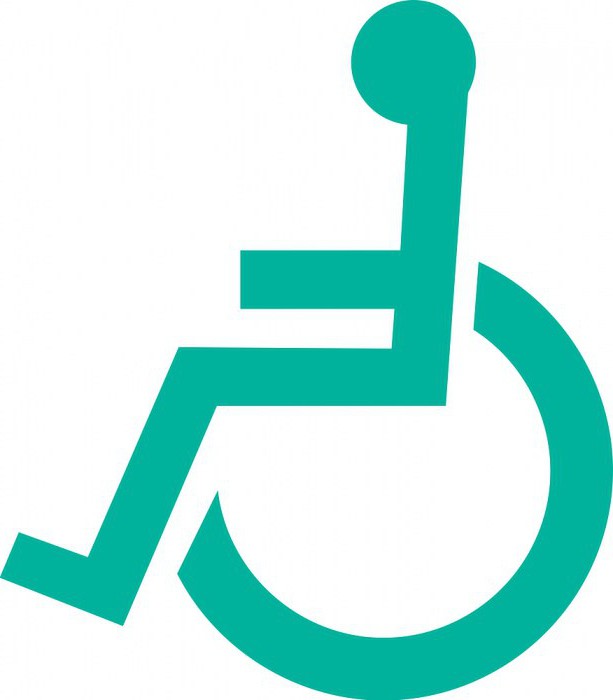Having a disability, finding work in our country is quite difficult. Not every entrepreneur agrees to work with a person with disabilities, because health does not allow such people to work at a level with others. Others also predict in advance that hiring a disabled person of group 3 is a guarantee that a person will be on sick leave all the time instead of a workplace. Of course, this is just a stereotype, but so far it has not been possible to debunk it. However, in reality there are much fewer problems with people with disabilities than with many healthy people, but you have to prove it every time in practice. In order for the manager to issue an order for hiring a disabled person, not only the person makes efforts, proving that he will do the job, but also the state that gives the company preferences if there are persons with disabilities among the staff.

Benefits and rights: is it possible to count on something?
If a disabled person finds a workplace, he has the right to insist on benefits, additional preferences laid down by laws. In our country, there is a fairly strong social legislation, from the existing standards certain advantages follow, which are worth using. Social programs are working to help find a job, adapt.
The Labor Code contains legal norms indicating that when hiring a disabled person of group 2, it is necessary to provide milder conditions to such a person. Additional legislative acts governing the rights of workers with disabilities. The first and most important norm is a shorter working day. The working week under the law on the admission of disabled people to work is 35 hours. How long to work for one day, they decide individually in each case, taking into account the results of a medical examination, which contains recommendations for the maximum duration.
We work and relax
In those days when going to work is not necessary - weekends, holidays - you can only attract a disabled person when the employee agrees and signs the paper, thereby confirming his consent. The standards are similar for cases when you need to go outside school hours or work out a greater number of hours than it relies on under an employment contract. However, even with the consent of the employee, such activity is not always possible - first you need to clarify whether this contradicts a medical opinion.

If the manager has decided in favor of hiring a disabled person, the personnel department will have to carefully monitor the temporary standards. According to the law, people with disabilities are entitled to leave for 30 days. In addition, each employee with a disability has the right to take up to 60 days of vacation per year without payment, at his own expense. The laws established the procedure for hiring a disabled person to work and cooperating with such a person excludes the possibility of refusing leave at their own expense.
The state distributes "buns"
The law provides benefits to employers in hiring disabled people. The system was designed so that entrepreneurs are more willing to collaborate with people with disabilities. But only those who apply for a disabled person to work in strict accordance with the Labor Code, and also provide him with all the right preferences, can get benefits.
All by the rules
According to the laws of our country, hiring a disabled person begins with studying a package of documents submitted to the personnel service by the job seeker.He will have to bring with him not only the documents that all citizens of our country present, but also a medical certificate confirming the fact of disability. The document must be certified by ITU. Additionally, the personnel service needs a copy of the IPR - rehabilitation program.
Without submitting documents to personnel officers, one cannot count on formalization in the established order. But if all the papers were sent to the personnel department and the management decided to issue an order for hiring a disabled person (a sample of this document should be contained among other samples of internal documents in the paperwork instructions), then you need to equip the workplace, taking into account the peculiarities of human health. At the same time, they are guided by the recommendations of the IPR, strive to create a place where the employee is not just comfortable, but additionally rehabilitated.
Where to go?
Refusals in hiring a disabled person are quite frequent in modern companies, as managers are afraid to get in touch with people who need special conditions, preferences and benefits. The state, developing measures to support people with disabilities, has introduced a special list of jobs available for people with disabilities of various categories. When compiling the list, health features and the specifics of various jobs were taken into account. At the same time, there are no restrictions on employment. If a disabled person is agreed to take a job outside this list, and he is satisfied with the conditions, according to the Labor Code, he has every right to work in the selected company.

If for a long time you can’t find a suitable place for yourself, you should contact a specialized enterprise in the village where the person lives. In almost all regional centers there are companies that work primarily with people with disabilities. These are state-owned enterprises, initially open to employ people with disabilities. Often they are organized on a specific basis: enterprises where the deaf are invited, a society where the blind work, and the like. These are stable places where you just need to bring documents when hiring a disabled person, confirm your status, and then enjoy all the privileges given by the state, but payment is often scanty.
Is there an alternative?
If it’s important for a disabled person not only to have at least some work place, not to be idle, but to earn his daily bread, then you have to look for less reliable options for private enterprises, and there is a high probability of refusal to interview. Under the law, entrepreneurs have privileges when hiring disabled people, but not everyone is ready to take a person with disabilities even under such conditions - and this despite the need to pay a fine. They argue this by the fact that creating conditions for the work of a disabled person is too expensive and difficult.

Another opportunity to work for a person with a disability is freelancer activity that allows you to work without leaving the walls of your home. At the same time, the employer is relieved of the need to create working conditions, he pays only after the fact for what has been done, but does not receive benefits. They work in this way, making tin soldiers at home, seamstresses, and journalists. But you need to be careful: many companies promise employment, but they delay and delay this moment. This means that they do not pay taxes for workers at home, that is, they do not accrue seniority.
Benefits: at home, at a party
We have a rather complicated system in place, so it’s not easy to figure out what benefits an employer gets for a disabled person. Much depends on the type of organization, the number of disabled people among regular workers, and the percentage. For example, the aforementioned disabled societies do not have to pay VAT, land tax or property tax at all.But this applies only to organizations in which 80% of the staff are people with disabilities. To some extent, this is legitimate protection against obtaining fake status.

If a society of persons with disabilities has invested money in the authorized capital of an enterprise, then it receives the same preferences as the company. In this case, the quota for hiring disabled people is 50%, receiving at least a quarter of the salary fund. When making calculations, only staff members are taken into account. If someone works within the framework of civil law contracts (GPA), such workers are not taken into account to derive proportions.
To whom else will it fall?
You can count on certain benefits if half of the staff (25% of the salary fund) belongs to the number of people with disabilities. In such organizations, hiring a disabled person allows you to access social programs, which reduces company expenses, reduces the amount that taxes will be charged. At the same time, it is important to take into account that the wage of a disabled person is paid with deduction of a lower percentage on insurance premiums.
In general, the logic is quite simple: the more important the enterprise is for society (which is expressed in the number of disabled people employed), the more privileges it receives. And this, in turn, leads to the fact that the state agrees to spend budget money on a significant person.
And where does it work like?
Quite close to the system installed in Russia, it operates in Poland. Companies also work here, there is a quota for hiring disabled people in order to get a number of preferences. Companies with 30% or more disabled people count on benefits. This is called “protected labor” and provides tax benefits. Managers are required to take care of staff so that people can undergo an accelerated rehabilitation program.

Another system in Poland and other European countries is the implementation of established quotas for hiring people with disabilities: preferences are given to a company that employs 5 percent or more of people with disabilities. Companies with at least 20 employees can count on benefits. Moreover, if these five percent are not, the company may be sentenced to a fine. The amounts are substantial - up to three thousand euros.
Does this work?
I must say, European entrepreneurs are not very different from our compatriots. As we have to pay a fine refusing to hire (it is cheaper than equipping a place), the European logic is similar. On average, an enterprise will have to invest more money than a one-time fine to make a full-fledged place, and employers do not comply with the established quotas for hiring disabled people.
Additional complexity involves dismissal. It is very difficult to do this legally, the procedure is long. But special preferences are received by people with disabilities who open their own business, but only when the entrepreneur has a small income. It is worth getting rich, and the benefits of the state will evaporate. It looks reasonable, otherwise many would like to open a case under the fake name of a sick granny.
Quotas, privileges and rules
Returning to Russia, it should be noted that the standards of social legislation in our country are quite strict. This is due to the fact that discrimination is unacceptable, including in the labor sphere. At the same time, people with disabilities who have been assigned a third group get a job almost in the same way as ordinary people without health problems, most of those involved in the second group can rely on the same conditions. The hardest thing is for those who have been assigned the first group. The employer will have to pay special attention to such an employee so that the work is efficient, and the person himself can develop. At the same time, it is likely that in the first group a person is completely disabled.

To organize the implementation of the quota for hiring disabled people, from the very beginning they are attentive to the process. Even at the stage of paperwork, you need to make sure that people coming to the company understood and understood the content of local regulatory acts (LNA) adopted by the company. It is necessary for each person to take a complete set of signatures certifying that people are familiar with the papers. This is done even before the signing of the contract governing the relationship between the employer and the employee.
Special situations
If a person has reached 18 years of age, then he is assigned the category of disability, but if a minor wants to get a job, he comes with the status of “disabled child”. You can take it by first organizing an examination of the applicant with doctors. Then, those who wish to work are introduced to the VLA, take signatures, draw up an employment contract and issue an order, thereby establishing that the person has been accepted into the state.
Moreover, people with disabilities can enjoy the rights to social guarantees (they are given by the state and laws), they can neglect them. You can use the rights even at the time of registration of labor relations or already during work. At the stage of registering an employment relationship, you can exercise your rights by requesting to include in the document a mention of the special regime of the working day, the duration of the vacation, for which payment will be charged. Additionally, you can require the design of the workplace in accordance with the particular health of a particular employee.
And if you are late?
A situation is possible when a person has already got a job, and has not yet submitted documents on disability. To get access to the preferences laid down by law, it is necessary not only to bring the missing documentation to the personnel department. The lawyers of the company will draw up an additional agreement, where they will discuss the special conditions applicable to the disabled person, but not spelled out in the main contract. Only after concluding such an agreement will it be possible to continue work.
A situation is also possible when, during the work process, it became clear that, for medical reasons, a person is not allowed to work at the chosen place. The agreement cannot be renegotiated; the only way out is to terminate the employment relationship. This is evidenced by the TC in the first part of article 77.
Quotas: yes or no?
Disability quotas scare many businessmen with a fairly large staff. It would seem that by law it is necessary to take a certain percentage of people with disabilities to work, but there is no desire for this either from the leadership or from applicants. In any case, it seems that a fine cannot be avoided.
According to the law, the quota is such a minimum number of jobs that need to be registered so that people with disabilities can work. Only people with disabilities are taken here. On the allocation of quotas, the legislation contains standards since 1995, when the 181st Federal Law was adopted. The standards apply only to companies with more than 35 employees. All organizations must comply with the law. Additionally, acts regulating the size of the quota are adopted at the regional level.
Magic math
How to calculate how many disabled people need to be hired? Suppose a question was asked by the head of company A, whose staff consists of 120 people arranged with the execution of an employment contract. At the subject level, regulations regulate a quota of 2 percent for firms with more than a hundred employees. The simplest calculations show that two percent of 120 people are 2.4. Rounding is always done in a big way, that is, three people with disabilities must be accepted into the company.

If the company already has people with disabilities, they are taken into account when calculating the quota. An LNA is accepted, which indicates that work places are being equipped for the disabled.If there are fewer such people in the state than the calculation of the quota showed, you need to equip suitable jobs and include an empty position that a job seeker with disabilities can take. At the same time, the state accepts a jobseeker found independently or sent from the employment service.
Working right
According to the law, the task of an entrepreneur is to create jobs where people with disabilities can work. Suppose the company calculated the quota, agreed to accept several people with disabilities to close it, but did not create special working conditions for these people. By law, this is regarded as an open quota. Registration of labor relations is carried out through an employment contract. If a GPA and a contract are concluded with a disabled person, then this does not affect the closing of the quota.
A disabled person can search for a job on his own or with the help of a social service. The second option is more effective, in addition there is a right to unemployment benefits. If the company has not complied with the quota, but has refused to hire a disabled person, it may be fined. Failure can be justified, then the company is not in danger. It is possible not to painlessly accept a person with restrictions if his business qualities do not correspond to the position for which the applicant is applying. Decide whether denial is related to a person’s qualities or disability, to social services. In any doubt, the state authority sends the documentation to the court for a fair trial.
However, not everything is so bad. If you accept a person with disabilities to work, you can thereby provide yourself with benefits, financial concessions, as well as additional financing from budget money for the design of the workplace. Any costs associated with supporting this category of citizens are among the others, that is, they are not taxed.